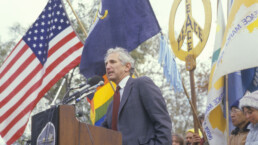In an interview before his death, the Pentagon Papers whistleblower urged the media and the government to be more honest about America’s bombing of civilians.
by Norman Solomon, The Intercept
On a warm autumn afternoon, I sat with Daniel Ellsberg on the deck next to his house. The San Francisco Bay shimmered off in the distance behind him. It was 2021, and more than 50 years had passed since Ellsberg — risking prison for the rest of his life — had provided the New York Times and other newspapers with 7,000 pages of top-secret documents that quickly became known as the Pentagon Papers. From then on, he continued to speak, write, and protest as a tireless antiwar activist.
I asked what the impacts would likely be if pictures of people killed by the U.S. military’s bombing campaigns were on the front pages of American newspapers.

“I am in favor, unreservedly, of making people aware what the human consequences are of what we’re doing — where we are killing people, what the real interests appear to be involved, who is benefiting from this, what are the circumstances of the killing,” Ellsberg replied. “I want that to come out. It is not impossible, especially [with] social media, where people can be their own investigative journalists and they can get it out and so forth. Where I have been somewhat disillusioned is not to think that can’t help, but to be aware it’s very far from being a guarantee that anything will change. There’s no question that the media, like the government, collaborates in keeping this from the [public’s] awareness and attention — and that, to some extent, is surely to the credit of the American people, who are surely less responsible having been lied to, than the ones doing the lying. But why were they lied to? How much would they do if they weren’t lied to?”
Recent Posts
“Arrest Now, Ask Questions Later”: Why Did L.A. ICE Agents Arrest and Jail U.S. Citizen Andrea Velez?
July 3, 2025
Take Action Now “They didn’t have vests that said ICE or anything. Their cars didn’t have license plates. … Just because of the color of our…
Trump’s Big, Beautiful Bill Is Naked Class War
July 3, 2025
Take Action Now Trump’s “Big, Beautiful Bill” trades tax cuts on millionaires for the dissolution of society.By Hamilton Nolan, In These Times…
Mayor Mamdani’s First Day, A Zero Hour Conversation With Richard Wolff
July 2, 2025
Take Action Now If elected, what would Mayor Mamdani do on his first day in City Hall? How would a democratic socialist govern as a big-city mayor?……
The U.S. Is Funding A Bloodbath At Gaza Aid Centers
July 2, 2025
Take Action Now The admin just gave $30M to GHF, the organization at the center of charges that Israel is weaponizing assistance and shooting at…




